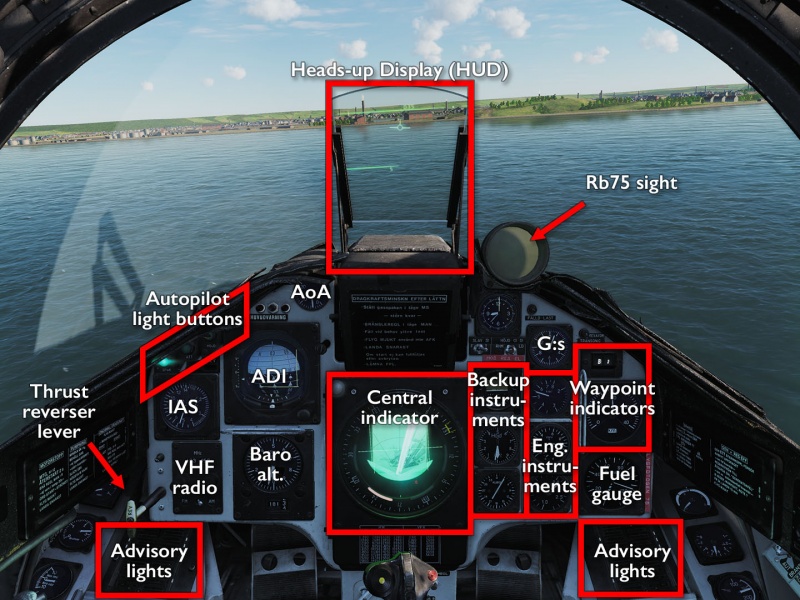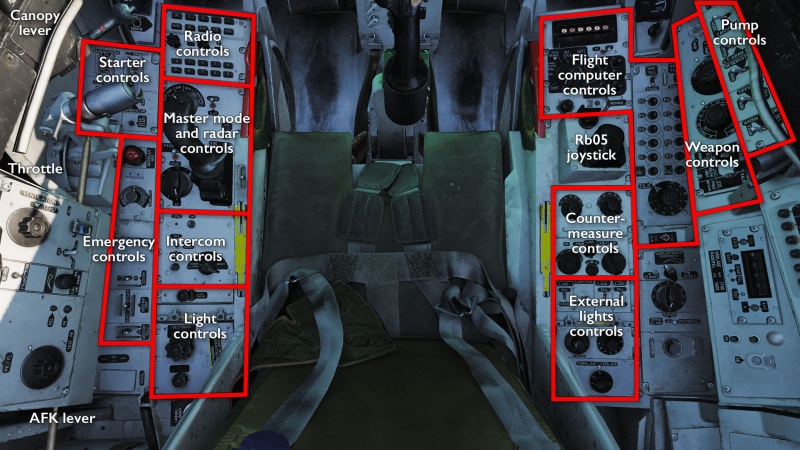AJS-37 Viggen: Difference between revisions
m (→�) |
m (→�) |
||
| Line 22: | Line 22: | ||
* TERNAV ground sensors for self-correcting INS navigation. | * TERNAV ground sensors for self-correcting INS navigation. | ||
* A massive three-stage afterburner and a thrust reverser for STOL operation. | * A massive three-stage afterburner and a thrust reverser for STOL operation. | ||
* Lots of opportunities for compressor stalls as you pull | * Lots of opportunities for compressor stalls as you pull into a higher AoA than the poor jumbojet engine can handle. | ||
* A sturdy landing gear and mission-editor features to allow the creation and use of road-side bases. | * A sturdy landing gear and mission-editor features to allow the creation and use of road-side bases. | ||
* An assortment of very oddball weapons such as: | * An assortment of very oddball weapons such as: | ||
Revision as of 22:21, 4 July 2018
| This is a beta module.
This module is still being developed and may still be missing some features and equipment options. It is playable and most of the content is there, but some final touches and fixes for minor bugs are still in the works. It is probably safe to buy unless you crave absolute fidelity and/or very few bugs. |
It is the 1960:s, the red scare is real, and the only thing separating you from said reds is 130km of open water. So what do you do? Why, you take a 727 engine, strap an afterburner on it, take advantage of the fact that look-down/shoot-down radars are still a decade or two away, and build something that uses one of these newfangled “computer” thingamajigs to stay stable while screaming along at Mach a bajillion just above the waves, of course!
Welcome to the AJS-37 Viggen — 🇸🇪🇸🇪🇸🇪 objectively the best 🇸🇪🇸🇪🇸🇪 definitely one of the more oddball aircraft to be featured in DCS World. The Viggen (“Thunderbolt”) is a Swedish supersonic, low-altitude attack aircraft with a special penchant for anti-shipping tasks, built around the concept of operating from dispersed roadside bases and making fast single-run attacks against pre-planned targets. And the word “bases” does not imply runways, hangars, and control towers, but rather a friggebod, a support 245, and the country road itself.
While the AJS model featured in the module is a much later variant that has been upgraded to carry more advanced weapon systems that were planned for its successor — the JAS-39 Gripen — and with elint and ECM capabilities that allowed it to recon its own (again mainly shipping) targets, it is still quintessentially a 1960:s-design aircraft. Not that you would necessarily know, since it features many advanced systems that would not come into widespread use until much later, such as heavy automation to reduce the pilot workload, a central computer tying all the different systems together, and programmable delivery modes and even programmable weapons.
Features
Sitting firmly on the fence line of the cold war (officially at least), the Swedes had a long tradition of doing things their own way by the time the Viggen was designed. Consequently, very little you encounter in the AJS-37 module will fall in line with what one might expect from the clear-cut east-vs-west split of the other DCS aircraft, or indeed from the operations they have tended to simulate up until this point.
Instead, it features:
- A confounding but actually very clear and informative HUD that does not resemble anything you are familiar with on the NATO or WP side.
- An even more confounding, and much less clear and informative data IO system using backwards coordinates.
- Silly amounts of flight- and instrument automation, including an auto-throttle.
- The first ground radar in DCS, including a low-light terrain avoidance mode.
- TERNAV ground sensors for self-correcting INS navigation.
- A massive three-stage afterburner and a thrust reverser for STOL operation.
- Lots of opportunities for compressor stalls as you pull into a higher AoA than the poor jumbojet engine can handle.
- A sturdy landing gear and mission-editor features to allow the creation and use of road-side bases.
- An assortment of very oddball weapons such as:
- The Rb04 and Rb15 advanced programmable anti-shipping missiles.
- The Rb05 radio-controlled multi-purpose missile.
- The BK90 programmable cluster munitions
bombglider.
Comes with the built-in campaign The Mjölnir Response.
Missing features
With Heatblur having delivered the AJS-37 in a reasonably well-working state, and with their working on the much more popular and anticipated F-14 module, the AJS-37 is still marked as early access in the DCS store for a reason. Most of what is needed is there, and even working, but the module has suffered some slight abandonment issues since its release, at least as far as final polish goes. It is still missing:
- Proper damage modelling of the BK90 submunitions makes it work
- Fixes for a number of multiplayer bugs (again causing problems with the BK90).
- A complete and fully illustrated manual.
- Reference photos and textures from the right variant, leaving some switches and illustrations mislabelled.
Flying the AJS-37
Cockpit overview
Getting into the air
Shooting something
Programming weapons
Links and files
- Chuck's AJS-37 Viggen guide.
- DCS: AJS-37 Viggen by Heatblur Simulations in the DCS shop.
Related DCS modules
- AJS-37 Viggen: 16-2 Red Flag Campaign by B&W Campaigns
More information
- Saab 37 Viggen on wikpedia.
- VIGGEN AJ-37 (SAAB) on globalsecurity.org
- Bunyap's Test Flight - DCS: AJS-37 Viggen video series.







